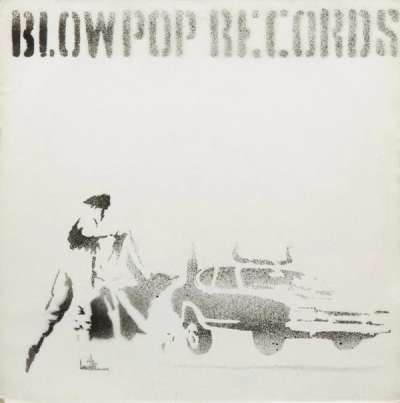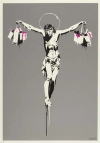Blowpop
Records
Early in his career, Banksy created an edition of 100 vinyl sleeves for music artist, Capoeira Twins', release under Blowpop Records. Combining two symbols of machismo— a matador and a '70s muscle car —he created a humorous exaggeration and an anachronistic intersection. Banksy's witty love of juxtaposition is evident.
Banksy Blowpop Records For sale
Blowpop Records Value (5 Years)
Banksy's Blowpop Records series has historically shown more modest results compared with the artist’s wider oeuvre, with auction prices ranging from £2477 to £10075. Average annual growth has remained modest at -7.11%, with certain works seeing declines in value. Over 10 total auction appearances, average selling prices have held steady around £6211. This series appeals to collectors seeking accessible entry points into Banksy’s print market.
Blowpop Records Market value
Auction Results
| Artwork | Auction Date | Auction House | Return to Seller | Hammer Price | Buyer Paid |
|---|---|---|---|---|---|
 Blowpop Records Banksy Unsigned Spray Paint | 21 Jan 2021 | Cornette de Saint Cyr Paris | £1,913 | £2,250 | £3,200 |
Sell Your Art
with Us
with Us
Join Our Network of Collectors. Buy, Sell and Track Demand
Meaning & Analysis
Blowpop Records by British street artist and activist Banksy is a rare work on a record sleeve from the artist's early career made in 1999. Banksy designed the image for a limited release of the Capoeira Twins’ electronic music record containing the tracks 4X3 and Truth Will Out. Back then, before Banksy was internationally known, the artist offered to create Capoeira Twins’ record cover and 100 copies were given to the DJs of that period for free in England. Each piece is unique as all of them were hand stencilled by the artist. The very same image was used for the street promotion of the record in the streets of London and Bristol.
Blowpop Records is painted with black acrylic and spray paint. It is composed of a black aerosol stencil image and is executed on a white cardboard record sleeve. The image shows a matador in action, shaking a cape at a 1970s era muscle car with bull horns mounted to its roof. The image is a clever and humorous take on exaggerating two traditional symbols of romanticised “machismo” and masculinity. The tongue-in-cheek, unapologetic tone of this image already carries the early signs of Banksy’s signature humour.
The title Blowpop Records is written in stencil capital letters at the top of the image and refers to Bristolian Blowpop Records music label, the owner of which Banksy is said to have befriended and made the cover free of charge. Neither the name of the band and the tracks, nor the artist's signature are visible on the cover, which gives particular power and emphasis to the illustration.







